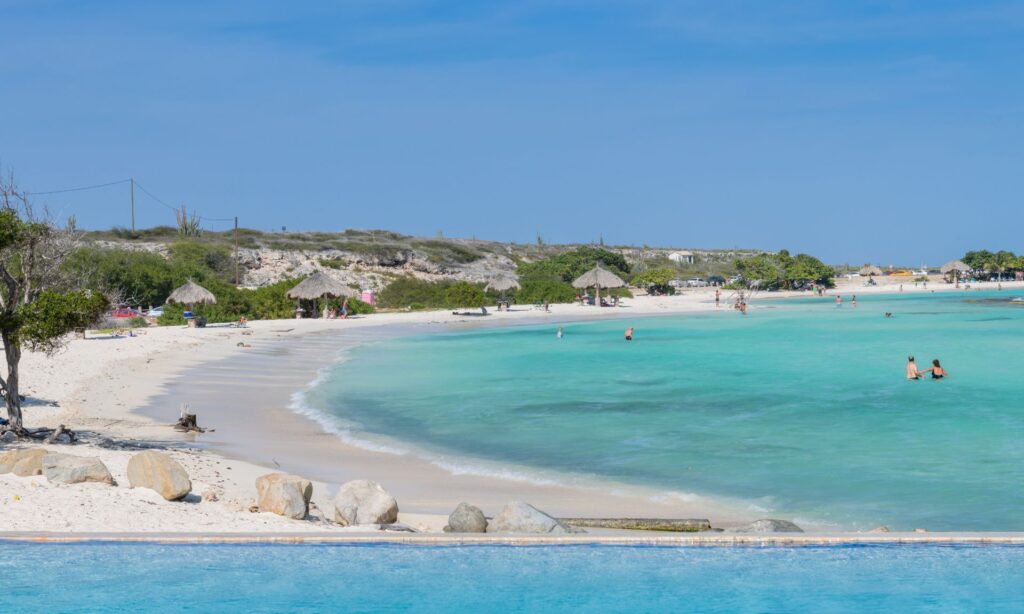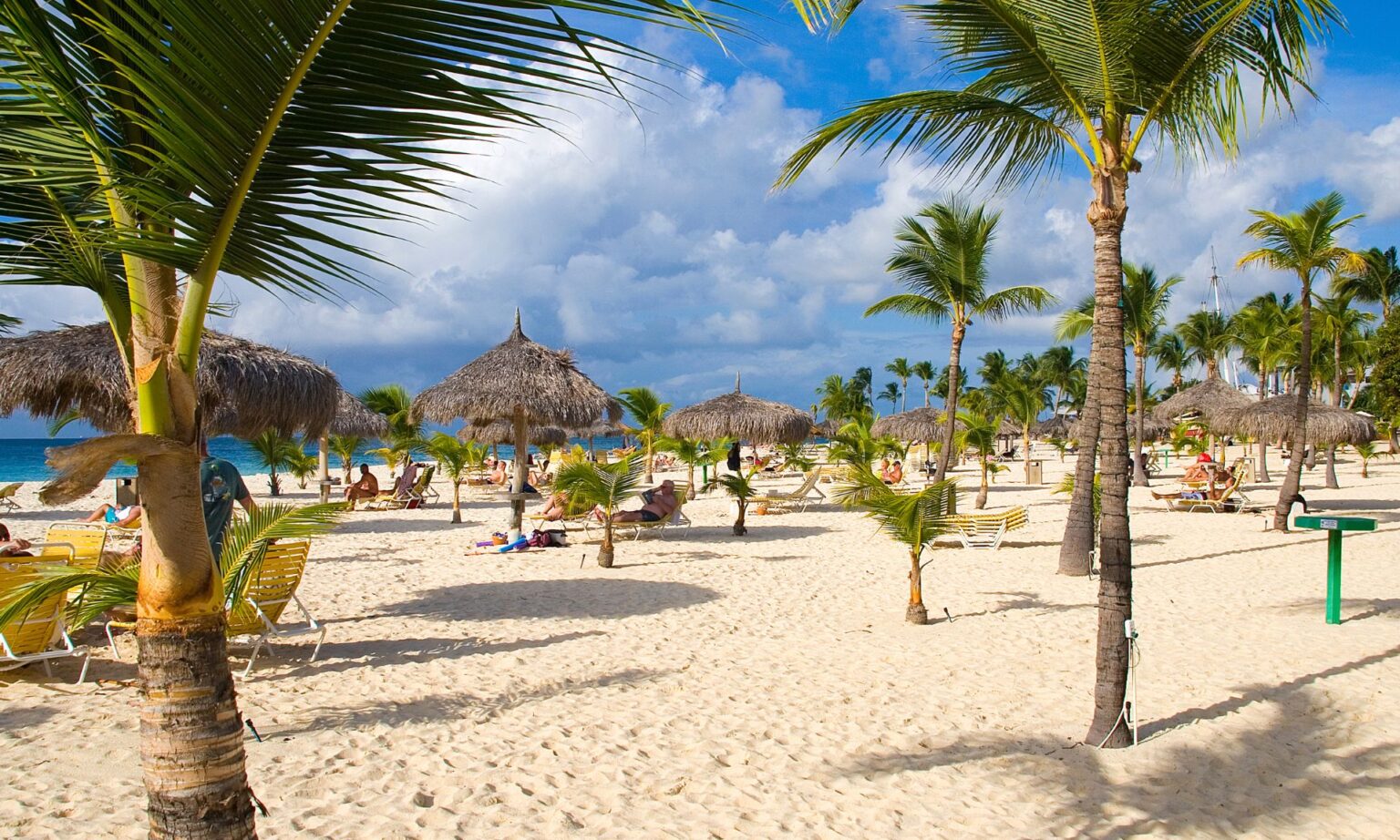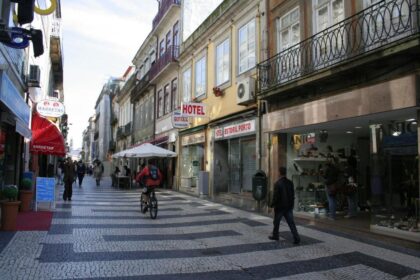Introduction
Aruba, known for its stunning beaches, vibrant culture, and warm hospitality, is often perceived as a destination for luxury travelers. However, this Caribbean gem has hidden treasures that cater to budget-conscious travelers seeking an unforgettable experience without breaking the bank. From pristine beaches to cultural hotspots, here are the top five affordable places to visit in Aruba.
Eagle Beach

Nestled on the western shore of the island, Eagle Beach stands out as one of the most affordable and breathtaking spots in Aruba. With its powdery white sands and crystal-clear turquoise waters, Eagle Beach is a haven for sunbathers and water enthusiasts. The beach offers free access, making it an ideal destination for budget travelers. Take a stroll along the iconic Fofoti trees that dot the shoreline, providing natural shade, and enjoy a budget-friendly day in paradise.
Arikok National Park

For those seeking an affordable adventure amid Aruba’s natural wonders, Arikok National Park is a must-visit. Covering nearly 20% of the island, this protected area boasts unique landscapes, including limestone caves, rugged hills, and the famous Natural Pool. Entrance fees are reasonable, and visitors can explore the park on foot, by bike, or via a guided tour. The park also provides an opportunity to discover Aruba’s diverse flora and fauna, offering a budget-friendly alternative to the more expensive tourist attractions.
Oranjestad’s Colourful Architecture

Aruba’s capital, Oranjestad, is a vibrant hub showcasing the island’s rich history and Dutch influence. Strolling through the streets of downtown Oranjestad, visitors can admire the colorful colonial architecture without spending a dime. The Wilhelmina Park and Fort Zoutman, the oldest building on the island, are free to explore. Immerse yourself in the local culture by visiting the bustling markets, where budget-friendly local crafts and souvenirs can be found.
READ ALSO: Aruba Hotel Prices – How Much Do Hotels Cost?
Malmok Beach Snorkeling

Snorkeling in Aruba need not be an expensive activity. Malmok Beach, located on the island’s northwest coast, offers budget-friendly snorkeling opportunities. The calm and shallow waters make it an ideal spot for beginners, and the coral formations teem with marine life. Bring your snorkeling gear or rent it from a nearby shop, and you’ll be treated to a colorful underwater world without the hefty price tag.
Baby Beach

Tucked away on the southeastern tip of the island, Baby Beach is a serene and family-friendly destination that won’t break the bank. The shallow, calm waters make it perfect for swimming and snorkeling, and the beach’s relaxed atmosphere provides a peaceful escape. While there are some facilities available, bringing your own snacks and drinks can help keep costs down. The panoramic views and the gentle sea breeze make Baby Beach a budget-friendly paradise.
Aruba, often celebrated for its high-end resorts and luxury experiences, also offers a wealth of affordable attractions for budget-conscious travelers. From the pristine shores of Eagle Beach to the natural wonders of Arikok National Park, these five destinations showcase the diverse and budget-friendly side of this Caribbean gem. So, pack your bags and explore Aruba without breaking the bank, discovering the beauty and warmth of the “One Happy Island.”
Frequently asked questions
Below are some frequently asked questions along with their answers:
1. What is the best time to visit Aruba?
The best time to visit Aruba is during the dry season, which runs from late December to mid-April. This period offers pleasant weather with lower humidity and minimal rainfall, making it ideal for outdoor activities and beach relaxation.
2. Is Aruba a safe destination for tourists?
Yes, Aruba is generally considered a safe destination for tourists. The island has a low crime rate, and the local authorities prioritize the safety of visitors. However, it’s always advisable to take common-sense precautions, such as safeguarding belongings and being aware of your surroundings.
3. What is the currency used in Aruba?
The official currency of Aruba is the Aruban Florin (AWG). However, the U.S. dollar is widely accepted, and many establishments also take credit cards. It’s recommended to have some local currency for smaller transactions.
4. Do I need a visa to visit Aruba?
Aruba has a visa-free policy for citizens of many countries, allowing stays of up to 30 or 90 days. Check the official government website or contact the Aruban consulate to confirm the specific requirements based on your nationality.
5. What are the must-try local dishes in Aruba?
Some of the must-try local dishes in Aruba include Keshi Yena (stuffed cheese), Funchi (cornmeal side dish), Aruban Pastechi (savory pastries), and fresh seafood, such as Red Snapper and Conch. Don’t forget to try the local dessert, Roly Poly, a sweet rolled pancake.
6. Are there budget-friendly accommodation options in Aruba?
Yes, Aruba offers a range of accommodation options to suit different budgets. In addition to luxury resorts, there are budget-friendly hotels, guesthouses, and vacation rentals available, especially in areas like Oranjestad and Noord.
7. What outdoor activities can I enjoy in Aruba?
Aruba is a paradise for outdoor enthusiasts. You can enjoy activities such as snorkeling at Baby Beach, exploring Arikok National Park, windsurfing at Hadicurari Beach, and hiking the Hooiberg or Casibari rock formations. The island also offers jeep tours and horseback riding adventures.
8. How is the transportation system in Aruba?
Aruba has a well-developed and reliable transportation system. Taxis are readily available, and there are public buses that cover major routes. Renting a car is a popular option for exploring the island independently, and bicycles and scooters are also available for rent in certain areas.
9. What language is spoken in Aruba?
The official languages of Aruba are Dutch and Papiamento. However, English and Spanish are widely spoken, especially in tourist areas. Visitors will find that most locals working in the tourism industry are fluent in English.
10. Are there any cultural events or festivals in Aruba?
Yes, Aruba hosts various cultural events and festivals throughout the year. The Carnival in February/March is a highlight, featuring colorful parades and lively celebrations. The Bon Bini Festival, held every Tuesday in Oranjestad, showcases local music, dance, and cuisine, providing a glimpse into Aruba’s rich culture.
Conclusion
In conclusion, Aruba, often celebrated for its luxurious resorts and high-end experiences, proves to be a versatile destination that caters to a wide range of travelers, including those on a budget. From the pristine shores of Eagle Beach to the natural wonders of Arikok National Park, the “One Happy Island” offers a diverse array of affordable attractions.
Visitors can bask in the beauty of Eagle Beach without spending a dime, explore the unique landscapes of Arikok National Park at reasonable entrance fees, and immerse themselves in the vibrant culture of Oranjestad without breaking the bank. For water enthusiasts, Malmok Beach provides an affordable snorkeling haven, while Baby Beach offers a tranquil and budget-friendly escape on the southeastern coast.
Aruba’s affordability does not compromise the quality of the experience. The island invites travelers to explore its natural wonders, savor local flavors, and embrace the warmth of its people without exceeding their budget. So, whether you’re a sun-seeker, an adventure enthusiast, or a culture lover, Aruba welcomes you to discover its treasures without the hefty price tag, ensuring an unforgettable and budget-friendly Caribbean getaway.
In another related article, Guide to Traveling to Aruba: Requirements and Safety Tips







